Barney's Version
This was the official website for the picaresque and touching story of the politically incorrect, fully lived life of the impulsive, irascible and fearlessly blunt Barney Panofsky.
Content is from the site's archived pages and other outside sources.

Premiere: April 1, 2010
R Theatrical (limited): January 14, 2011
R Theatrical: February 18, 2011
Barney's Version Movie Trailer Official (HD)
Synopsis
Based on Mordecai Richler's prize-winning comic novel—his last and, arguably, best—BARNEY'S VERSION is the warm, wise, and witty story of Barney Panofsky (Paul Giamatti), a seemingly ordinary man who lives an extraordinary life. A candid confessional, told from Barney's point of view, the film spans four decades and two continents, taking us through the different acts? of his unusual history. There is his first wife, Clara (Rachelle Lefevre), a flame-haired, flagrantly unfaithful free sprit with whom Barney briefly lives la vie de Boheme in Rome. The second Mrs. P. (Minnie Driver), is a wealthy Jewish Princess who shops and talks incessantly, barely noticing that Barney is not listening. And it is at their lavish wedding that Barney meets, and starts pursuing, Miriam (Rosamund Pike), his third wife, the mother of his two children, and his true love. With his father, Izzy (Dustin Hoffman) as his sidekick, Barney takes us through the many highs, and a few too many lows, of his long and colorful life. Not only does Barney turn out to be a true romantic, he is also capable of all kinds of sneaky acts of gallantry, generosity, and goodness when we—and he—least expect it. His is a gloriously full life, played out on a grand scale. And, at its center stands an unlikely hero—the unforgettable Barney Panofsky.
Cast: Paul Giamatti, Dustin Hoffman, Rosamund Pike, Minnie Driver, Rachelle Lefevre, Scott Speedman, Bruce Greenwood
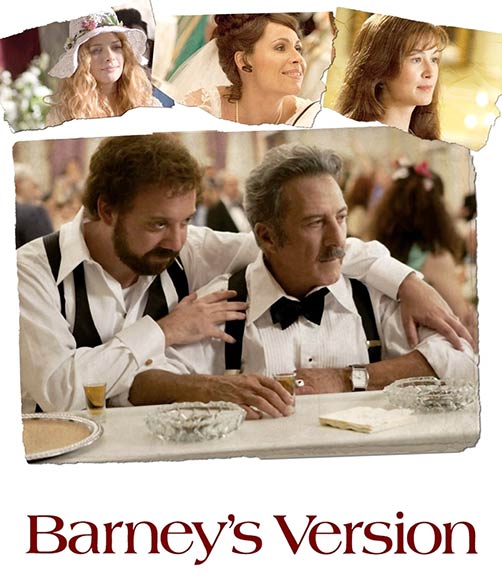
TOMATOMETER CRITICS 80% | AUDIENCE 78%
CRITICS' REVIEWS
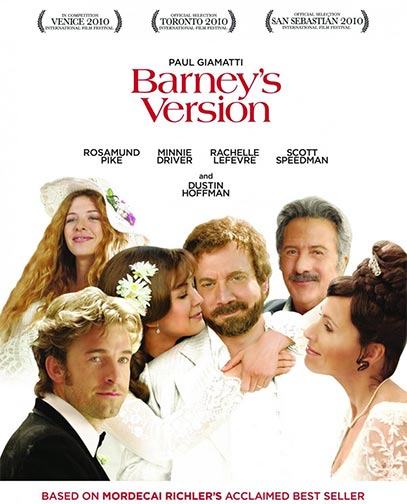
'Barney's Version' of a colorful life
March 18, 2011
***1/2 Rafer Guzman Newsday Top Critic
Please clip and save this review until after you've seen "Barney's Version." The movie, much like your own life, is best enjoyed when you don't know exactly what happens next.
If you're still reading, don't worry about major plot spoilers - there is no plot. The fluid, freewheeling narrative, based on Mordecai Richler's 1997 novel, centers on Barney Panofsky (Paul Giamatti), a successful television producer, womanizer and reluctant Jew in Montreal. He comes by his roguishness honestly: His father, Izzy (Dustin Hoffman, fleetingly superb), gives him a gun for a wedding present. Even less respectable is Barney's best friend, an erudite drug addict nicknamed Boogie (Scott Speedman).
That gun, and Boogie, will bring Barney under suspicion of murder, though this is the least memorable occurrence in his colorful life. After losing his first wife, a bohemian artist named Clara (Rachelle Lefevre), Barney tries going legit with a respectable woman he calls only The Second Mrs. P (a very funny Minnie Driver). It's not the most solid relationship. You can tell because Barney begins wooing the beautiful Miriam (Rosamund Pike) during his own reception.
Giamatti is pitch-perfect as the all-too-human Barney, while Pike, as the fiercely principled Miriam, proves every ounce his equal. (You could call her a revelation, but she's already been one, in 2009's "An Education.") And while director Richard J. Lewis occasionally goes for broad strokes, he's aware that small moments are more important. Those make the movie, just as surely as they make a life.
+++
Empty
February 11, 2011
Michael Rechtshaffen Hollywood Reporter Top Critic
Acclaimed Canadian author Mordecai Richler's last and arguably greatest novel, "Barney's Version," has been transformed into a highly entertaining and arguably the most satisfying Richler screen adaptation to date.
The impeccably cast confessional, with a pitch-perfect Paul Giamatti leading the way, nimbly traverses the four decades in its lead character's eventful life with considerable exuberance, visual flair and, ultimately, grace.
Produced by Robert Lantos, who brought Richler's "Joshua Then and Now" to the big screen in 1985, and assuredly directed by Richard J. Lewis ("Whale Music"), the picture undoubtedly will draw kudos in its home and native land and likely beyond, buoyed by that virtuouso Giamatti performance.
Not since Richard Dreyfuss so capably inhabited the title role in 1974's "The Apprenticeship of Duddy Kravitz" has a Richler (the author died in 2001) lead character been brought to life as effectively as Giamatti's irascible, rumpled Barney Panofsky.
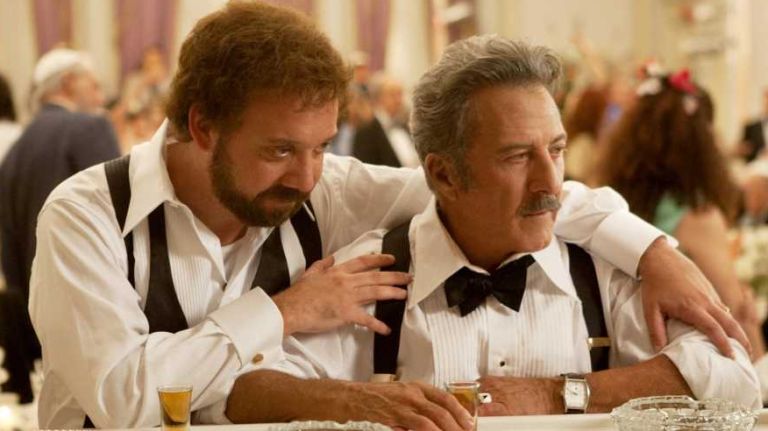
Hard to like but tougher to hate, Panofsky relives his warts-and-all memoirs, otherwise known as "the true story of my wasted life," encompassing several countries and an equal number of wives.
There's his early, bohemian existence in Rome with Mrs. Panofsky No. 1, the free-spirited Clara (Rachelle Lefevre), whom Barney marries when she becomes pregnant.
It ends, and Barney returns to his Montreal home -- Richler's signature stomping grounds -- getting a job at a cheesy TV production company and meeting and soon marrying the Second Mrs. P., a chatty, pampered Jewish princess (amusingly played by Minnie Driver).
To say the union is doomed is an understatement, given that he proceeds to meet the love of his life, the elegant, sophisticated Miriam (a luminous Rosamund Pike), right smack in the middle of his wedding reception.
With the support of his raucous cop father, Izzie (an absolutely terrific Dustin Hoffman), he eventually persuades Miriam to become the Third Mrs. P. and the mother of his two kids. (Barney's son, played by Jake Hoffman, is a dead ringer for his real-life dad, Dustin, circa "The Graduate.")
Considering Barney's lifelong penchant for insensitivity, he's still a long way off from a happily-ever-after ending.
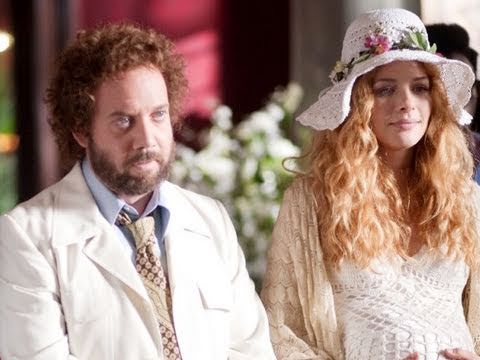
As he demonstrated with his roles in "Sideways" and "American Splendor," Giamatti excels at playing difficult curmudgeons, but in "Barney's Version," he also possesses a stubborn vulnerability that's indispensable to the film's palpable poignancy.
His relationships to his fellow cast members are alternately comical, tragic and tender but somehow never quite as genuine as the bond he has with the elder Hoffman.
Working from a tidy but still expansive adaptation by Michael Konyves, Lewis integrates the various time passages as smoothly and efficiently as those lively character interactions.
After playing New York so many times, it's nice to see Montreal get to play itself, and the city's richly unique milieu, along with that of Rome and New York, has been lavishly captured by Guy Dufaux's vibrant cinematography and Claude Pare's warm, earthy production design.
As an added bonus, smaller roles are filled by a who's who of the Canadian film industry, including cameos by David Cronenberg, Denys Arcand, Atom Egoyan and Ted Kotcheff.
+++
July 1, 2011 | Rating: 2/4
David Nusair Reel Film Reviews
Barney's Version (June 28/11)
A minor improvement over Mordecai Richler's nigh unreadable book, Barney's Version details the life and times of the incorrigible title character (Paul Giamatti) - with a particular emphasis on Barney's relationships with the various women in his life (ie his three wives). It's a premise that could've (and should've) been used as a springboard for a brisk character-based comedy, and it does seem, in the outset, that that's exactly what filmmaker Richard J. Lewis has accomplished. Giamatti delivers as engrossing and compelling performance as one might have expected, while the impressive supporting cast effectively injects bursts of color and energy into the proceedings. (Dustin Hoffman's scene-stealing turn as Barney's brutally frank father stands as an obvious highlight.) The movie's momentum takes a serious hit following the arrival of Minnie Driver's over-the-top character, however, as the actress, cast as Barney's caricature of a second wife, delivers a seriously grating performance that ultimately triggers the film's downfall - with the subsequent emphasis on sequences of a decidedly overlong and downright needless nature exacerbating the progressively less-than-engrossing atmosphere.
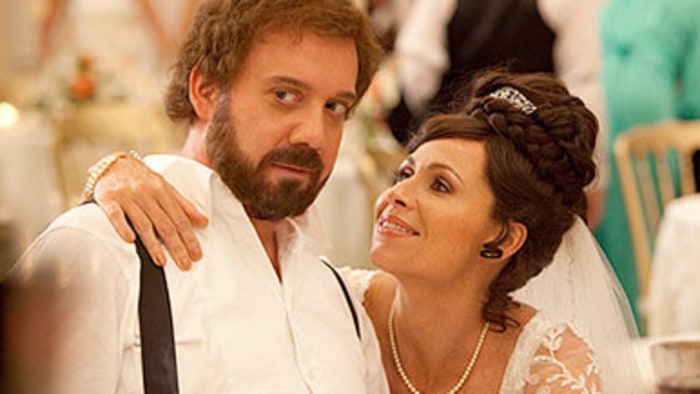
Scripter Michael Konyves' reliance on laughably inauthentic chunks of dialogue certainly doesn't help matters (eg "you really do wear your heart on your sleeve; now put it away, it's disgusting to look at"), and there inevitably reaches a point at which the relentlessly lighthearted vibe becomes impossible to stomach (ie one can't help but crave some substance and depth). The pervasive lack of substance proves effective at diminishing the emotional impact of the film's final scenes, which ultimately cements Barney's Version's place as a fairly misbegotten adaptation of a thoroughly underwhelming novel.
AUDIENCE REVIEWS
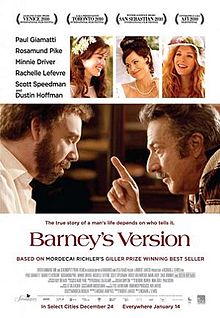
****½ Samuel B
January 7, 2012
I was hesitant to see Barney's Version, and I tried to read a page turner while it was playing, that did not last long. This is a great movie, with very strong and great performances from Paul Giamatii and also from Rosamund Pike. This is a love story, yes, and it is not a member of the Twilight Saga, but the latter is probably why it is so good. It seems real and true. We see the adult life of the protagonist and we are with him and against him at the same time. This dramedy will most likely not win over Twihards, but it is, nevertheless, a funny, sad and great picture I'm glad I didn't miss.
+++
**** Ellis P
January 4, 2012
+++
****½ Sebastián S
January 2, 2012
Barney is a slave to his desires, you could also trade the word "desire" for "whim". The story of a nice guy with a heart but weak to temptation, a heartbreak story. And the movie is heartbreakingly beautiful, Dustin Hoffman seemed to understand it since his performance improved the movie in a way only a great actor can.
P.S. Giamatti deserved the Golden Globe he got and the Oscar he didn't get
+++
***** Susann E
January 2, 2012
This was the sweetest film. I loved it. The love story is touching, but the fater son relationship is just as moving.
+++
***** Majid S
January 2, 2012
it just gets better and better and better and... this movie deserves 5 stars.. loved it.. Paul Giamatti and Hoffman.. The best.. And just because of this movie, Rosamund Pike has become one of my favorites..=)
+++
***** Simone D
January 1, 2012
Great movie about life and you never know what can happen :)
+++
**** Luca B
December 27, 2011
A good movie, not really a brilliant one.

+++
**½ Zack F
December 23, 2011
Barney's Version has an epic feel and length for a movie that doesn't need such epicness. Barney's begins as a great character piece, and a great story of a man's evolving romantic life, but as the extreme length keeps going the film turns up too many unnecessary plot turns creating a lost tone for the film. But despite being a film of too much, Paul Giamatti is not too much. He shows his talent in superb manner and is the one reason that makes you continue all the way through the movie.
+++
***½ Liam P
December 23, 2011
SUMMING IT UP:
It's all over the place but what life story isn't? Paul Giamatti is in top form and Rosamund Pike - seriously what does the woman have to do to get some awards attention - splendid as one of his put upon wives. The entire cast is good and despite an unnecessary ending the film leaves a contented feeling at its conclusion. Good without being great.
More Background on BarneysVersionTheMovie.com
BarneysVersionTheMovie.com was the official online home of the film “Barney’s Version,” a 2010 Canadian feature adapted from Mordecai Richler’s celebrated novel. More than just a promotional tool, the site became a central resource for information on the film’s production, cast, reviews, history, themes, and enduring cultural impact. This article provides a comprehensive exploration needed for students, fans, and anyone seeking a thorough understanding of the film and its place in literature and cinema.
Ownership, Production, and Development
The film was produced by Robert Lantos, a champion of Canadian cinema, and directed by Richard J. Lewis. The screenplay was adapted by Michael Konyves, who managed to distill Richler’s intricate, decades-spanning narrative into an accessible and highly emotional film.
Production Background:
-
The movie began development after the novel’s release in 1997, with many recognizing the challenge of capturing the novel’s voice, which is both self-deprecating and bitingly satirical.
-
Principal photography took place in key locations relevant to the story: Montreal, Rome, and New York. This gave the film its distinctive North American and European feel, mirroring Barney Panofsky’s journey across continents and cultural boundaries.
-
The film had a production budget of around $30 million and was distributed primarily by Entertainment One.
Website Purpose and Content:
BarneysVersionTheMovie.com offered:
-
Trailers, teasers, and preview galleries
-
Cast and character biographies
-
Production notes and director’s statements
-
Behind-the-scenes galleries
-
Updates on premieres, awards, and festival appearances
-
Critical reviews and press synopses
-
A focus on connecting film fans, readers of the novel, journalists, and educators
Film Overview and Narrative Structure
Main Characters:
-
Barney Panofsky (Paul Giamatti): The caustic, deeply flawed protagonist whose version of events drives the narrative.
-
Miriam Grant (Rosamund Pike): Barney’s third wife and the deep love of his life, whose patience and intelligence anchor Barney’s journey.
-
Izzy Panofsky (Dustin Hoffman): Barney’s roguish, loving father, a retired police officer central to Barney’s morality.
-
Clara Charnofsky (Rachelle Lefevre): Barney’s unstable first wife, whose tragic story shadows the film.
-
The Second Mrs. Panofsky (Minnie Driver): A wealthy woman whose marriage to Barney is comically mismatched.
-
Boogie (Scott Speedman): Barney’s charismatic but self-destructive best friend, whose mysterious fate drives part of the story.
Plot in Detail:
Barney Panofsky, an acerbic Jewish-Canadian TV producer, navigates three marriages, a stormy relationship with his ex-cop father Izzy, and a lifelong mystery regarding his vanished friend Boogie. He marries Clara, his first wife, in Rome after she claims pregnancy; her instability and infidelity culminate in suicide, marking Barney with grief and guilt. Returning to Montreal, Barney falls for the “Second Mrs. Panofsky,” whose personality jars with his, leading to a doomed union.
At this second wedding, Barney meets Miriam Grant, a sophisticated, principled woman. Smitten, Barney embarks on a relentless pursuit — sending gifts, writing letters, and contriving excuses to see her. Barney’s second marriage collapses after he discovers her infidelity, providing him the opportunity to pursue Miriam. As Barney and Miriam ultimately marry and raise children, Barney seems to find, for a time, purpose and stability.
The drama is further complicated when, during a drunken argument at his lake house, Barney's best friend Boogie disappears. Barney is accused of murder but is never charged, haunted by the unresolved loss throughout his life. Meanwhile, as Barney ages, he spirals downward: heavy drinking, professional malaise, and acts of emotional negligence strain his third marriage. His lifelong love for Miriam is overshadowed by his inability to change; eventually, his infidelity and stubbornness lead to divorce. Miriam, steadfast and compassionate, moves on with her life, but not without continued care for Barney as his memory fades due to dementia.
The film closes with scenes of reconciliation and reminiscence: Barney, suffering memory loss, sometimes refers to Miriam as his wife as if nothing changed, a poignant testament to the depth and endurance of genuine love — and to the way life’s “version” is shaped by memory as much as by fact. Barney’s children take comfort in the possibility that Boogie’s fate was a tragic accident, providing symbolic closure as both Barney’s and Boogie’s stories come to an end.
Themes, Symbolism, and Adaptation Choices
The film stands out for its exploration of memory, regret, love, and the unreliable nature of personal narrative. Faithful to Richler’s novel but tailored for the screen, it juggles satire, dark comedy, and heart-rending moments. The adaptation streamlines the book’s sprawling structure but preserves its emotional core and the complexity of Barney’s character.
Key Themes:
-
Jewish Identity and Montreal Life: The setting and cultural reference points highlight the North American Jewish experience and Canada’s multiculturalism.
-
Marriage and Partnership: By portraying Barney’s three marriages (each fraught, each instructive), the film examines the different reasons people choose partnership — for comfort, desire, escape, or true love.
-
Aging, Memory, and Legacy: As Barney confronts memory loss, the question of how one’s life is remembered — and by whom — becomes central.
-
Male Imperfection and Self-Realization: Barney is often insensitive, boorish, and self-destructive, yet viewers are invited to see his vulnerabilities and quests for redemption.
Production, Awards, and Critical Recognition
Cast and Performances:
-
Paul Giamatti’s turn as Barney Panofsky is widely regarded as one of his career’s finest, earning him the Golden Globe for Best Actor in a Comedy/Musical.
-
Dustin Hoffman brings warmth and vibrance to Izzy Panofsky, providing both comic relief and emotional depth.
-
Rosamund Pike’s portrayal of Miriam is hailed for its intelligence, strength, and understated beauty.
Awards and Accolades:
-
Nominated for the Golden Lion at Venice Film Festival (2010)
-
Won the Golden Globe for Best Actor (Paul Giamatti)
-
Nominated for the Academy Award for Best Makeup (Adrien Morot)
-
Many national and international film festival accolades, including Genie Awards and Canadian Screen Awards
Website Features and Resources
On BarneysVersionTheMovie.com, users could access:
-
Detailed bios of the cast and creative team
-
High-resolution stills from key scenes and behind-the-scenes
-
Streaming trailers and video interviews with cast and crew
-
Insights into adaptation, including challenges of translating Richler’s voice to screen
-
Educational content regarding the novel’s legacy in Canadian and Jewish literature
-
User forums and commentaries for audience engagement and debate
Audience Demographics:
-
Literary fans of Richler
-
Canadian cinema enthusiasts
-
North American Jewish audiences
-
Film festival followers
-
University and high school educators teaching contemporary literature and film
Cultural and Social Significance
“Barney’s Version” occupies a unique place in both literary and film canons:
-
The novel and film are acclaimed for their raw honesty about fallible masculinity, the complexities of love, and the imperfect search for meaning.
-
The movie served as a point of pride for the Canadian film industry, symbolizing the country’s growing ability to create internationally respected cinema.
-
For Jewish communities, the film’s portrayal of intergenerational relationships and Montreal’s Jewish culture resonated deeply.
-
Feminist critics noted both the insight and limitations of the film’s male-centric view, with Miriam providing a rare, nuanced female counterbalance in such narratives.
Press Coverage and Reviews
The film generated extensive press, with in-depth features and reviews in The New York Times, Los Angeles Times, Variety, and The Guardian. Reviewers praised the adaptation’s performances and narrative intricacy:
-
The Los Angeles Times called the screenplay adaptation a “triumph,” commending the “textured, nuanced” performances and the director’s deft stripping down of the plot to its most essential loves, tragedies, and transformations.
-
Variety noted the film’s decades-spanning ambition, complemented by humor and heartbreak.
-
Reviewers universally highlighted Giamatti’s work as transcendent, with Hoffman’s Izzy Panofsky as a highlight.
User reviews cited the film’s emotional range, finding it both comic and deeply moving, and often remarking on its excellence as an adaptation.
Examples, Insights, and Noteworthy Details
-
The production’s attention to Montreal’s unique urban and cultural geography, with scenes tailored to landmarks recognizable to locals and evocative to outsiders.
-
The lake house, recurring in the film, functions as both a literal and a psychological place of reckoning for Barney.
-
The use of music and editing, under Pasquale Catalano and Susan Shipton, helped convey time jumps and shifts in Barney’s memory.
-
Makeup by Adrien Morot was so transformative as to earn an Oscar nomination, especially in decay and aging sequences.
BarneysVersionTheMovie.com was not just a promotional platform but a living extension of the film’s ethos: layered, compassionate, and deeply self-aware. “Barney’s Version” remains a modern classic—both as a film and a website—a celebration of flawed humanity, enduring love, and the multiple truths held within every life story. It is a touchstone for Canadian cinema, Jewish culture, and the universal wrestle with memory, regret, and redemption.